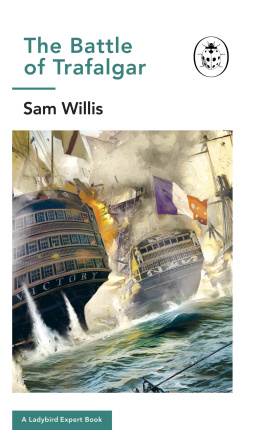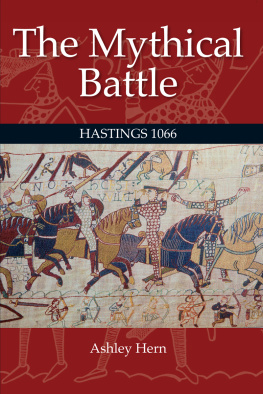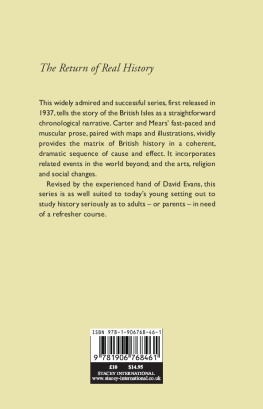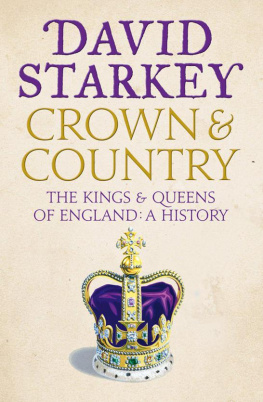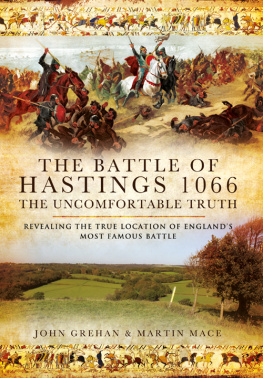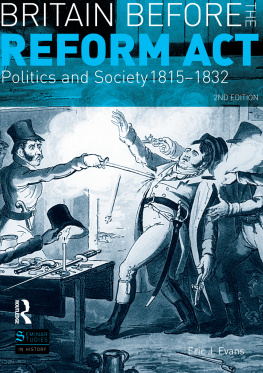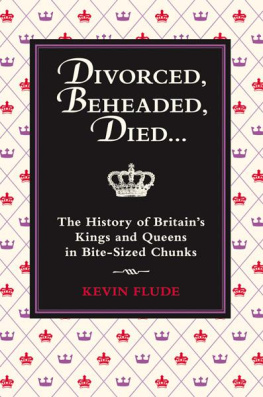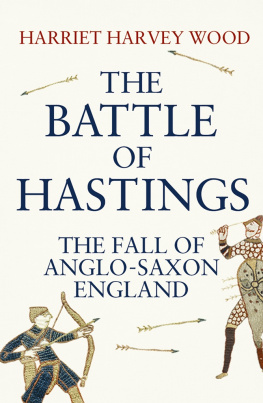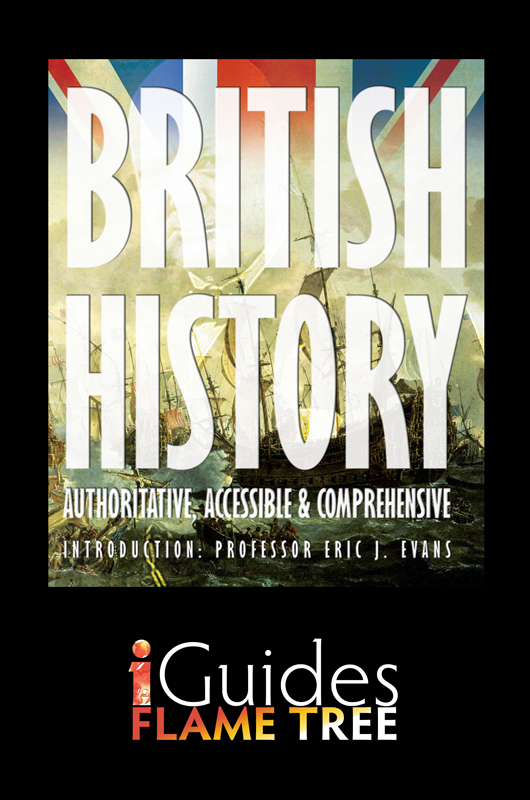British History
General Editor: Professor Eric J. Evans
Authors: Gerard Cheshire, David Harding, Lucinda Hawksley, Brenda Ralph Lewis, Jon Sutherland, Helen Tovey
A Flame Tree iGuide
Contents

Credits
Bibliography
Ball, S. J., The Cold War: An International History, 19471991 , Hodder Arnold, London, 1998
Black, C. F., Greengrass, M., Howarth, D. et al, Cultural Atlas of the Renaissance , Oxford, 1993
Blair, P. H., Roman Britain and Early England , 55 bcad 871, Nelson, 1963
Chandler, David, The Dictionary of Battles , Henry Holt & Co., London, 1987
Darvill, T., Prehistoric Britain , Routledge, London, 1987
Eliade, Mircea, A History of Religious Ideas , Chicago, 1984
Fussell, P., The Great War and Modern Memory , Oxford University Press, London, 1975
Gilbert, Martin, Second World War , London, 1989
Goodman, A., The Wars of the Roses , Military Activity and English Society, 14521497, Routledge, London, 1981
Greene, D. M., Greenes Biographical Encyclopedia of Composer s, London, 1996
Hart, L., The History of the Second World War , Da Capo Press
Herrin, J., The Formation of Christendom , Princeton University Press, Oxford, 1987
Hobsbawn, E. J., Industry and Empire , London, 1990
Holmes, George (ed.), The Oxford Illustrated History of Medieval Europe , Oxford University Press, Oxford, 1988
Hughes, Robert, The Shock of the New , Thames and Hudson, London, 1991
Keen, M., The Pelican History of Medieval Europe , Pelican, London, 1968
Langmuir, Erika, and Norbert, Lynton, The Yale Dictionary of Art and Artists , Yale University Press, 2000
Ling, Trevor, A History of Religion East and West , Harper and Row, London, 1977
Lloyd, T. O., The British Empire, 15581995 , Oxford University Press, Oxford, 1996
Mayr-Harting, H., The Coming of Christianity to Anglo-Saxon England , London, 1972
Morgan, Kenneth O. (ed.), The Oxford Illustrated History of Britain , Oxford, 1997
Morillo, S., Warfare under the Anglo-Norman Kings, 10661135 , Woodbridge, 1994
Norwich, John Julius (ed.), The Oxford Illustrated Encyclopedia of the Arts , Oxford University Press, Oxford, 1984
Pakenham, T., The Scramble for Africa, 18761912 , Random House Publishing, London, 1991
Pollard, A. J., The Wars of the Roses , London, 1988
Radway, R., Britain, 19001951 , Hodder Arnold, London, 1997
Rolleston, T. W., Celtic , Senate, London, 1995
Salway, P., Roman Britain , Oxford, 1981
Savage, A. (trans.), The Anglo-Saxon Chronicles , Guild, London, 1982
Smout, T. C., A History of the Scottish Peoples , London, 1969
Taylor, A. J. P., English History, 19141945 , Oxford University Press, Oxford, 1965
Treasure, Geoffrey, Whos Who in British History , Shepheard-Walwyn, London, 1997
Tucker, S. C., The Great War , London, 1998
Wood, Jack, Union for Recovery: The Failure and Rise of British Industry , Wembley, 1986
Young, John, W., Britain and the World in the Twentieth Century , London, 1997
Authors
Eric Evans (Introduction)
Eric Evans is Professor of Social History at the University of Lancaster. He has edited and contributed to numerous studies on the history of the British Isles, as well as writing many of his own titles, including The Birth of Modern Britain and The Complete AZ 19th and 20th Century British History Handbook .
Gerard Cheshire (Industry and Society)
Gerard Cheshire is a prolific writer. He has written and contributed to many books on a wide range of subjects, including science, social history and technology, as well as magazine articles and partworks.
David Harding (Politics)
David Harding is an experienced journalist. His specialist subject is political history and current affairs, but he also writes on subjects as diverse as sport and war.
Lucinda Hawksley (Culture)
Lucinda Hawksley is a freelance writer and editor. She studied art history and has published several books on art, including Pre-Raphaelites.
Brenda Ralph Lewis (Royalty)
Brenda Ralph Lewis has been writing on historical subjects for 35 years, specializing in the history of the British royal family. She has written or contributed to nearly 100 books on the subject and also writes BBC television programmes.
Jon Sutherland (War)
Jon Sutherland is an experienced writer and lecturer in business studies. He has written and contributed to over 100 books and encyclopedias on a wide range of subjects. His specialist area is military history.
Helen Tovey (Religion)
Helen Tovey completed a degree in History at the University of Exeter. Since then she has been working as a writer and editor, specializing in British and European social history, religion, art and architecture.

Culture
Stonehenge (c. 3000 bc)
The exact origins of the stone circle in Wiltshire known as Stonehenge are a mystery. Archeological evidence has proved that the site has been used for religious and sacred rituals, including sacrifice, but no definitive initial purpose for the site can be given with certainty. There is also no rigid evidence as to how, and by whom, the monument was erected, but it was constructed in alignment with the orbit of the Sun: at the summer solstice the Sun rises directly overhead.
Avebury (c. 2600 bc)
Avebury is the largest known stone circle in the world. It is composed of an outer ring and two inner circles, with the tallest stones over 6 m (20 ft) in height. Thirty-six stones are still standing, but there are believed to have been at least four times as many in previous centuries. As with Stonehenge, Aveburys exact origins are a mystery, but it is known to have been a sacred site.
Edinburgh Castle (c. ad 7th century)
The oldest parts of Edinburgh Castle date back to Edwin of Northumbria, from whom the city takes its name. The first mention of the castle as a royal residence is at the time of Queen Margarets death (1093). In 1174 the castle was won by Henry II, but passed back to the Scots in 1186. The first Scots parliament met here in 1215. Edward I took the castle in 1291 and looted many of its treasures. It was won back again in 1313, after which most of it was destroyed by Robert Bruce so the English could never take it again. Despite this, battles continued to rage for centuries between the two nations over the site and subsequent buildings. In 1566 James VI (I of England) was born here.
Bede the Venerable (c. ad 673735)
The English religious writer and historian Bede lived in what is now county Durham. Orphaned at the age of seven, he was subsequently looked after by a religious order. At 19 he became a deacon and was a priest by 30. He knew Latin, Greek and possibly Hebrew. His works include De Orthographia , De Natura Rerum and, the most famous, Ecclesiastical History of the English Nation written in Latin, this was first translated into English by Alfred the Great.
Westminster Abbey (c. 10th century)
Reputedly there has been a place of worship here since the ad 700s. William I was crowned in Westminster Abbey, setting a precedent for future monarchs. This royal connection saved the building from destruction during the Dissolution of the Monasteries (the religious order settled here was dissolved). In the Civil War the abbey housed Cromwells soldiers, and was partially destroyed. Christopher Wren assisted with its restoration. The abbey contains many illustrious memorials, and the area known as Poets Corner contains many graves of, or memorials to, great writers, including Charles Dickens and William Shakespeare.
Next page

